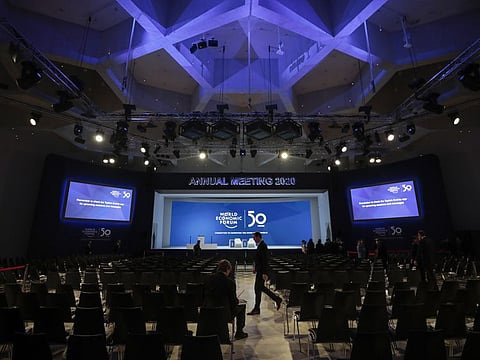The Davos bubble swallows anyone who tries to pop it
The private jets arriving but now they’re filled with “Sustainable Aviation Fuel”

By Lionel Laurent
“Davos is not one thing. There are many Davoses at Davos.”
This haiku-like meditation on the annual Swiss junket - which is known for preaching the gospel of touchy-feely stakeholder capitalism against a backdrop of $43 hot dogs, $10,000 hotel rooms, and several hundred trips by private plane - could have come from any number of its rich, powerful and blissfully un-self-aware attendees. That it comes from a co-founder of the anti-capitalist movement Occupy Wall Street, Micah White, as part of a long explanation of why he is attending Davos this year, says a lot about why global capitalism’s biggest tent is still standing even in an age of populist anger. The Davos bubble is turning out to be quite good at swallowing those who would like to pop it - however justified their cynicism. Davos was, let’s face it, supposed to have been “canceled” by now. Last year’s event resembled one long guilt trip: Billionaires awkwardly batting away ideas like higher taxes for the rich; Sir David Attenborough telling an audience packed with private-jet users that “the Garden of Eden is no more; and historian Rutger Bregman going viral with his description of Davos as a hypocritical talking shop.
“Stop talking about philanthropy, and start talking about taxes,” he berated attendees. Well, this year, Davos is back - minus Bregman - and it’s more Davos-y than ever. The private jets are still flying in, only now they’re being asked to fill their tanks with “Sustainable Aviation Fuel.”
Davos organizer Klaus Schwab is still welcoming powerful CEOs but has made sure to ask them to commit to a net-zero economy by 2050. The rooms will be painted with renewable sources like seaweed. The carpets will be made from end-of-life fishing nets and fluff. And lest anyone think the debates on offer have gotten more humble, there are 25 panels under the banner, “How To Save The Planet.” Davos isn’t just good at greenwashing the globalists. It’s also good at co-opting the populists. The junket has shrewdly realized that offering a stage to an anti-Davos crowd can work in its favor. Micah White, for one, is excited to dip his toe into “the most powerful gathering in the world.”
He will be lecturing a money-and-politics crowd that he once wanted to smash apart on how to turn “protest into progress.”
Incongruities
There will be other incongruities: Greta Thunberg will tread the same boards as Donald Trump; France’s Bruno Le Maire will promote a tax on tech firms in front of Google’s Sundar Pichai. It’s this veneer of exclusive neutrality that Davos clearly wants to promote as its value proposition, rather than just being a hyper-efficient version of LinkedIn.
“We bring together people of influence, and we hope that they use their influence in a positive way,” Schwab told the New York Times. Or, in other words: Everyone who matters is here - even if they disagree, Davos wins in the end. Like an Alpine version of Soho House, Davos is a (not-for-profit) club that lives and dies by its guest list. White’s description of “many Davoses” includes secretive back-room meetings that don’t get filmed - a Davos within Davos, in other words. This seems intuitively strange in an era of political activism and social media, when boycotts seem to spring up out of nowhere and cause serious brand damage. Couldn’t Davos be simply replaced? Author Anand Giridharadas suggested that genuine do-gooders had no reason to be wandering into a billionaires’ tent. Instead, they could work through the United Nations to create a new global conference.
“We could create a new body. We could have it rotate among certain countries,” he told Project Syndicate last year. It’s an interesting point - we could. But national versions of Davos, such as those promoted by France or Saudi Arabia, have failed at being either as neutral or as exclusive as the original. Maybe coming up with a new Davos isn’t as easy as it seems. Or maybe Davos is simply really good at protecting its brand. In 2018, the conference warned imitators that it would “use all means to protect the Davos brand against illicit appropriation.”
It has preserved its image as a truly global stage, even as incidents such as a ban on Russian businessmen targeted by sanctions (later lifted) show how it’s not politics-free.
White’s final warning to Davos critics is a well-aimed one: “Rejecting Davos is easy when one has not been invited to attend.” (This applies to yours truly.) Maybe the world’s most exclusive tent will only fall when it extends its membership to all-comers. Until then, expect the private jets to keep flying in “ on sustainable fuel.







